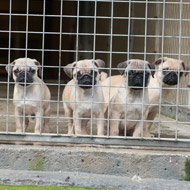
Public urged to research before they buy
Rehoming and adoption charity Dogs Trust is warning the public not to be duped into buying so-called ‘pink pugs’.
In a statement on its website, the organisation said: “Pink pugs are not a new craze, they have been around for many years. Combined with the fact that pugs generally are a breed known to suffer serious health problems we would strongly encourage anyone thinking of buying one to do their research.
“We have been investigating Puppy Smuggling for several years, and know that unscrupulous breeders will take any opportunity to con unsuspecting people out of more money. Pink pugs have been bred for years, so don’t be duped by anyone who tells you that they are the ‘latest canine craze.”
Pink pugs are in fact albino dogs, and the pink tinge is a result of a lack of melanin. This can happen to any breeds, not just pugs, and can dispose them to certain health conditions, such as photosensitivity.
Traditionally, pugs are bred in four colours, apricot, silver, black and fawn (pictured). But in recent days, reports that TV personality Kerry Katona has purchased a 'pink pug' appears to have sparked public interest for albinos.
“As we would suggest with anyone wanting to get a puppy - regardless of the colour or breed - please do your research before you buy. It’s super important that you find out everything you can about the breed, as well as the breeder,” Dogs Trust continued.
“We recommend visiting your local rescue centre first, but if you have chosen to go to a breeder we have lots of advice to give you the confidence that you are buying a healthy, happy puppy.”
Image (C) Dogs Trust



 Zoetis is to present a CPD event for free to members of the British Veterinary Nursing Association (BVNA).
Zoetis is to present a CPD event for free to members of the British Veterinary Nursing Association (BVNA).